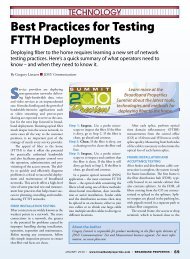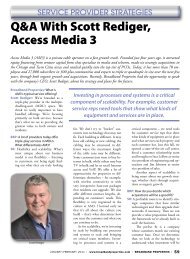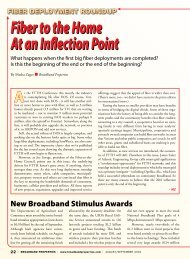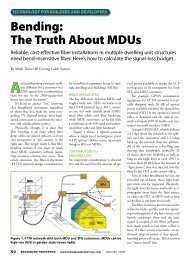2010 Buyers Guide - Broadband Properties
2010 Buyers Guide - Broadband Properties
2010 Buyers Guide - Broadband Properties
Create successful ePaper yourself
Turn your PDF publications into a flip-book with our unique Google optimized e-Paper software.
Country<br />
Stimulus<br />
Investment<br />
(USD Million)<br />
Jobs Expected<br />
From Stimulus Investment in Telecom Networks<br />
Network Deployment Jobs Estimate<br />
Direct Jobs Indirect Jobs Induced Jobs Total (Direct +<br />
Indirect) /<br />
Direct<br />
Multipliers<br />
(Direct + Indirect<br />
+ Induced) /<br />
Direct<br />
$6,390 37,000 31,000 60000 128,000 1.83 3.42<br />
Switzerland ~$10,000 ~80,000 ~30,000 NA ~110,000 1.38 NA<br />
Germany $47,660 281,000 126,000 135,000 542,000 1.45 1.94<br />
United Kingdom $7,468 76,500 134500 211,000 NA 2.76<br />
Australia $31,340 NA NA NA ~200,000 NA NA<br />
Source: Raul Katz, CITI<br />
Haskayne School of Business in Calgary,<br />
said. “Maybe it helps B-to-C<br />
commerce,” he added. He used firstdifferences<br />
regression to try to tease<br />
out causation from his 15-country<br />
data set, and didn’t see much effect.<br />
• Heather Hudson, professor of telecommunication<br />
at the University of<br />
San Francisco, looked at telecom’s<br />
role in rural and less-developed<br />
countries’ development. She showed<br />
a fiber trench being dug in Tanzania,<br />
where 37 of the 130 administrative<br />
centers are now connected by fiber,<br />
thanks to a Chinese-funded project.<br />
“But what is the quality of service?”<br />
she asked. “And what is the sustainability<br />
after the one-time funding<br />
goes away?”<br />
• Wireless is an important component<br />
of any national bandwidth enhancement<br />
plan, but alone it cannot handle<br />
the bandwidth, reliability and<br />
security that business demands. In<br />
the United States, AT&T Wireless<br />
has had trouble keeping up with the<br />
50-fold growth in wireless data traffic<br />
brought about by the iPhone. The<br />
inadequacy of the spectrum assigned<br />
to mobile communications also imposes<br />
physical limits on bandwidth<br />
growth.<br />
• Wireless can be a useful wedge to entice<br />
those on the far side of the digital<br />
divide to make their first leaps<br />
onto the Internet.<br />
What is not hard to predict is bandwidth<br />
demand. Said Robert Pepper, vice<br />
president for global technology policy<br />
at Cisco, “By 2014, just 50 U.K. homes<br />
will generate as much traffic as the entire<br />
U.S. Internet backbone in 1995.”<br />
Hurdles for<br />
<strong>Broadband</strong> Policy<br />
CITI founder Eli Noam noted that as<br />
part of its economic stimulus program,<br />
“Australia wants to create a state [network<br />
company] and then privatize it,”<br />
at a total cost of $23 billion, or about<br />
$5,000 per home. But, Noam asked,<br />
“How does the monopoly set its wholesale<br />
prices, stay technologically advanced<br />
and privatize while keeping prices low?<br />
This is a very ambitious plan with no<br />
clear end points.”<br />
Korea, Noam noted, has a stated goal<br />
of 100 Mbps per household, but dominant<br />
telco KT “is guaranteeing only 1<br />
Mbps and [providing] … closer to 2–3<br />
Mbps.” The Korean government wants<br />
a 30 Mbps guarantee, but to do that<br />
requires a peak capacity of 1 Gbps, he<br />
said. “So when you hear 1 Gbps there,<br />
it is not real.”<br />
Japan has the highest broadband<br />
penetration and lowest economic<br />
growth among OECD nations. Korea<br />
also has low productivity growth and<br />
high broadband penetration, one questioner<br />
noted. But what if Japan and Korea<br />
didn’t have broadband? Would their<br />
economic growth have been even lower?<br />
Said one Japanese scholar, “Japan is an<br />
information society but [the Japanese]<br />
do not have a [historical] context to<br />
make software. Now Japan is exporting<br />
$5 billion worth of software a year; expect<br />
it to be $20 billion in 2020.”<br />
Confusion was not limited to other<br />
nations. “In this administration, there<br />
are so many czars it is like a Romanov<br />
family picnic,” Noam quipped. Scott<br />
<strong>Broadband</strong> Impact as a Percentage of GDP<br />
In Europe, 2006-2007<br />
Source: MICUS<br />
Advanced-knowledge sociees<br />
EU 27<br />
Large industrial economies<br />
Quickly developing economies<br />
Less developed broadband<br />
0.47%<br />
0.63%<br />
0.71%<br />
0.70%<br />
0.89%<br />
0.00% 0.10% 0.20% 0.30% 0.40% 0.50% 0.60% 0.70% 0.80% 0.90% 1.00%<br />
The impact of broadband is greatest in the most advanced countries; 70 percent of net job creation<br />
related to broadband is due directly to innovation.<br />
November/December 2009 | www.broadbandproperties.com | BROADBAND PROPERTIES | 55

















